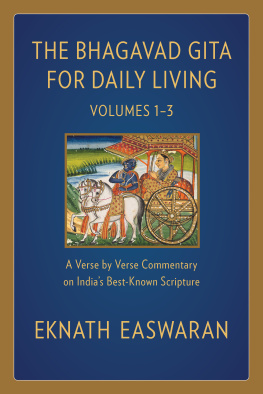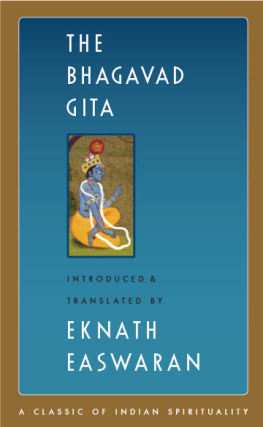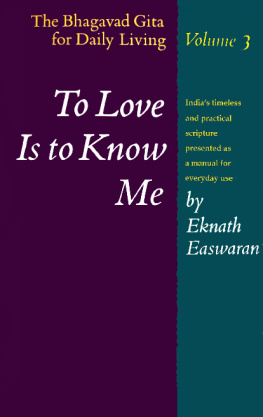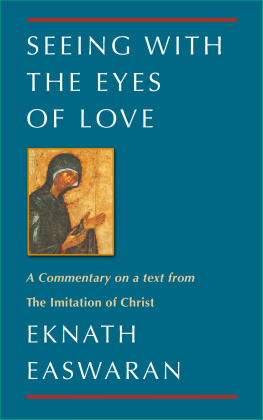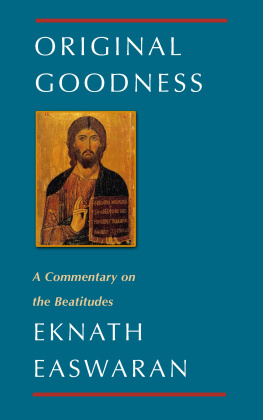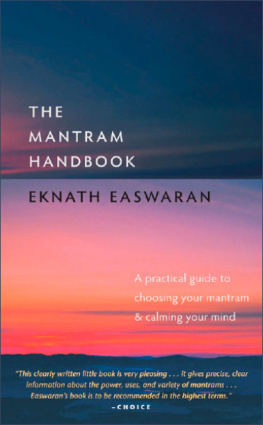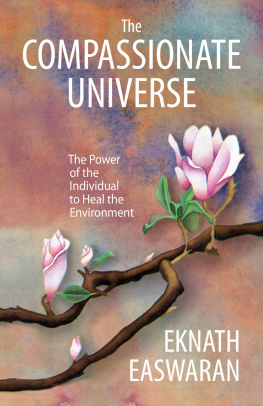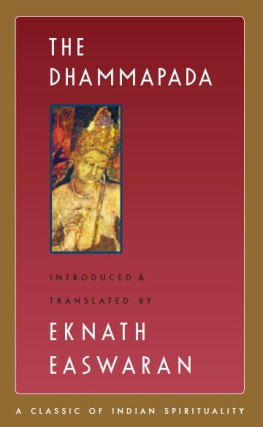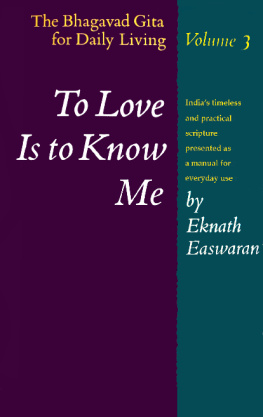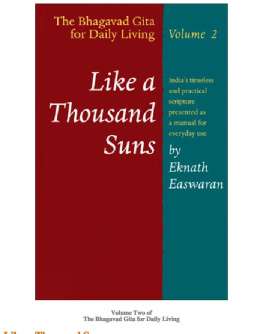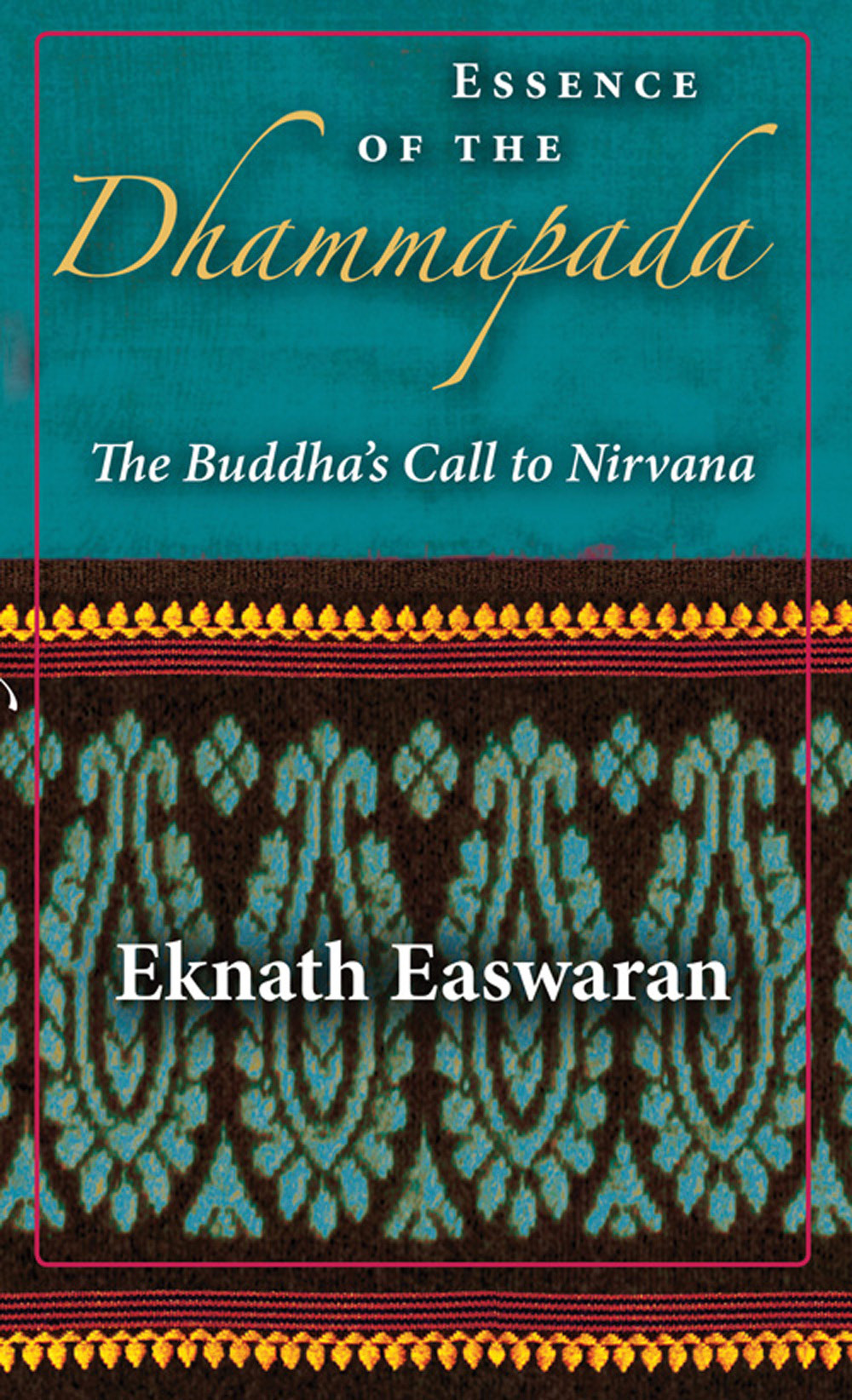Essence of the Dhammapada
The Buddhas Call to Nirvana
by EKNATH EASWARAN

NILGIRI PRESS
20130522
Table of Contents
PUBLISHERS NOTE
This book has been produced by Eknath Easwarans senior editors, longtime students who worked closely with him since his first book in 1970 and were charged by him with continuing to compile his books from transcripts of his talks after his passing.
In his last editorial planning meeting, in 1998, Easwaran gave instructions about the books in progress that he wanted completed from his unpublished transcripts, outlines, and notes. ESSENCE OF THE DHAMMAPADA is the second of those posthumous projects to be published: the legacy of a gifted teacher sharing his immersion in a sacred text, conveyed in his talks and informal sessions with some of his closest students.
It was Easwarans longstanding desire to publish his commentary on the scripture that he felt contained the direct inspiration of the Buddhas words. It is a privilege to bring out this book for his readers around the world.
SERIES PREFACE
The Wisdom of India
Some years ago I translated what I called the classics of Indian spirituality: the Upanishads, the Bhagavad Gita, and the Dhammapada. These ancient texts, memorized and passed from generation to generation for hundreds of years before they were written down, represent early chapters in the long, unbroken story of Indias spiritual experience. The Upanishads, old before the dawn of history, come to us like snapshots of a timeless landscape. The Gita condenses and elaborates on these insights in a dialogue set on a battlefield, as apt a setting now as it was three thousand years ago. And the Dhammapada, a kind of spiritual handbook, distills the practical implications of the same truths presented afresh by the Compassionate Buddha around 500 B.C.
These translations proved surprisingly popular, perhaps because they were intended not so much to be literal or literary as to bring out the meaning of these documents for us today. For it is here that these classics come to life. They are not dry texts; they speak to us. Each is the opening voice of a conversation which we are invited to join a voice that expects a reply. So in India we say that the meaning of the scriptures is only complete when this call is answered in the lives of men and women like you and me. Only then do we see what the scriptures mean here and now. G. K. Chesterton once said that to understand the Gospels, we have only to look at Saint Francis of Assisi. Similarly, I would say, to grasp the meaning of the Bhagavad Gita, we need look no farther than Mahatma Gandhi, who made it a guide for every aspect of daily living. Wisdom may be perennial, but to see its relevance we must see it lived out.
In India, this process of assimilating the learning of the head into the wisdom of the heart is said to have three stages: shravanam, mananam, and nididhyasanam; roughly, hearing, reflection, and meditation. These steps can merge naturally into a single daily activity, but they can also be steps in a journey that unfolds over years. Often this journey is begun in response to a crisis. In my own case, though I must have heard the scriptures many times as a child, I dont remember them making any deep impression. When I discovered the Bhagavad Gita, I was attracted by the beauty of its poetry; I didnt understand its teachings at all. It was not until I reached a crisis of meaning in my mid-thirties, when outward success failed to fill the longing in my heart, that I turned to these classics for wisdom rather than literary beauty. Only then did I see that I had been, as the Buddha puts it, like a spoon that doesnt know the taste of the soup.
Since that time I have dedicated myself to translating these scriptures into daily living through the practice of meditation. The book in your hands is one fruit of this long endeavor. Such a presentation can only be intensely personal. In my translations I naturally let the texts speak for themselves; here I make no attempt to hide the passion that gave those translations their appeal. To capture the essence of the Gita, the Upanishads, and the Dhammapada, I offer what I have learned personally from trying to live them out in a complex, hurried world. I write not as a scholar, but as an explorer back from a long, long voyage eager to tell what he has found.
Yet however personal the exploration, these discoveries are universal. So it is not surprising that at the heart of each of these classics lies a myth variations on the age-old story of a hero in quest of wisdom that will redeem the world. In the Upanishads, a teenager goes to the King of Death to find the secret of immortality. In the Gita, standing between opposing armies on the eve of Armageddon, the warrior-prince Arjuna seeks guidance from an immortal teacher, Sri Krishna. And behind the Dhammapada lies the story of the Buddha himself, a true story woven into legend: a prince who forsakes his throne to find a way for all the world to go beyond sorrow in this life. These old stories are our own, as relevant today as ever. Myth always involves the listener. We identify with its heroes; their crises mirror ours. Their stories remind us not only what these scriptures mean but why they matter. Like the texts themselves, they seek a response in our own lives.
So this book is both the fruit of a journey and an invitation. If you like, you may read it as a travelers tale rich in the experience of some distant place, enjoying the sights and adventures without the travail of actually making the trip yourself. But this place is really no more distant than the heart, so if you find that this description calls you to your own voyage of exploration, my highest purpose in writing will be fulfilled.
Introduction
It was many years ago that I fell in love with the Buddha not as a god, not as an angel, but as a man who was the finest flower of our five-thousand-year-old Indian civilization. There are many reasons to love the Buddha and to want to be like him, but most of all I was drawn to him because he fulfilled the long, long journey of human evolution. In his language, he reached the end of the way; he crossed the river of life.
Why did this man, born a prince named Siddhartha into whose lap the gods poured all their gifts, turn his back on everything that means so much to every one of us? In the age-old way of Indias saints and sages, he went in search of the answer to a question that has tormented humanity since the dawn of creation: Is there no way to cross the river of life, from a world of change and separateness to a far shore of unity, joy, and peace?
Once he began to seek an answer, Siddhartha did not rest until he found it. For six long years he searched and struggled, inflicting heroic experiments upon his body and mind. He would not go by what tradition had handed down: he would not accept what theology taught; he would not even trust reason and intellect. There was only one way in which he could know the truth, and that was to realize it for himself through hard self-discipline and even harder experience. For the Buddha, religion did not mean theology, metaphysics, dogma, or even faith. He sought personal experience, personal realization, which he finally achieved on the night of his enlightenment under the bodhi tree.
When Prince Siddhartha came into this life there was only a thin veil of illusion separating him from full enlightenment. He was born in the royal Shakya line, in a beautiful area at the foot of the Himalayas, destined to inherit his familys warrior tradition. As a young man he was taught by the best teachers and became proficient in the arts of peace and war, a superb horseman and archer. As a youth he was surrounded with all the pleasures of life: palaces, gardens, music, and dance. With a loving and beautiful wife, he had a son who promised to continue the royal tradition. All this Prince Siddhartha had, and yet nothing would satisfy him. All these appeared so small to him because, after many lifetimes of seeking, it was his destiny to reach the end of the way in this life, and to become the teacher of countless millions.


